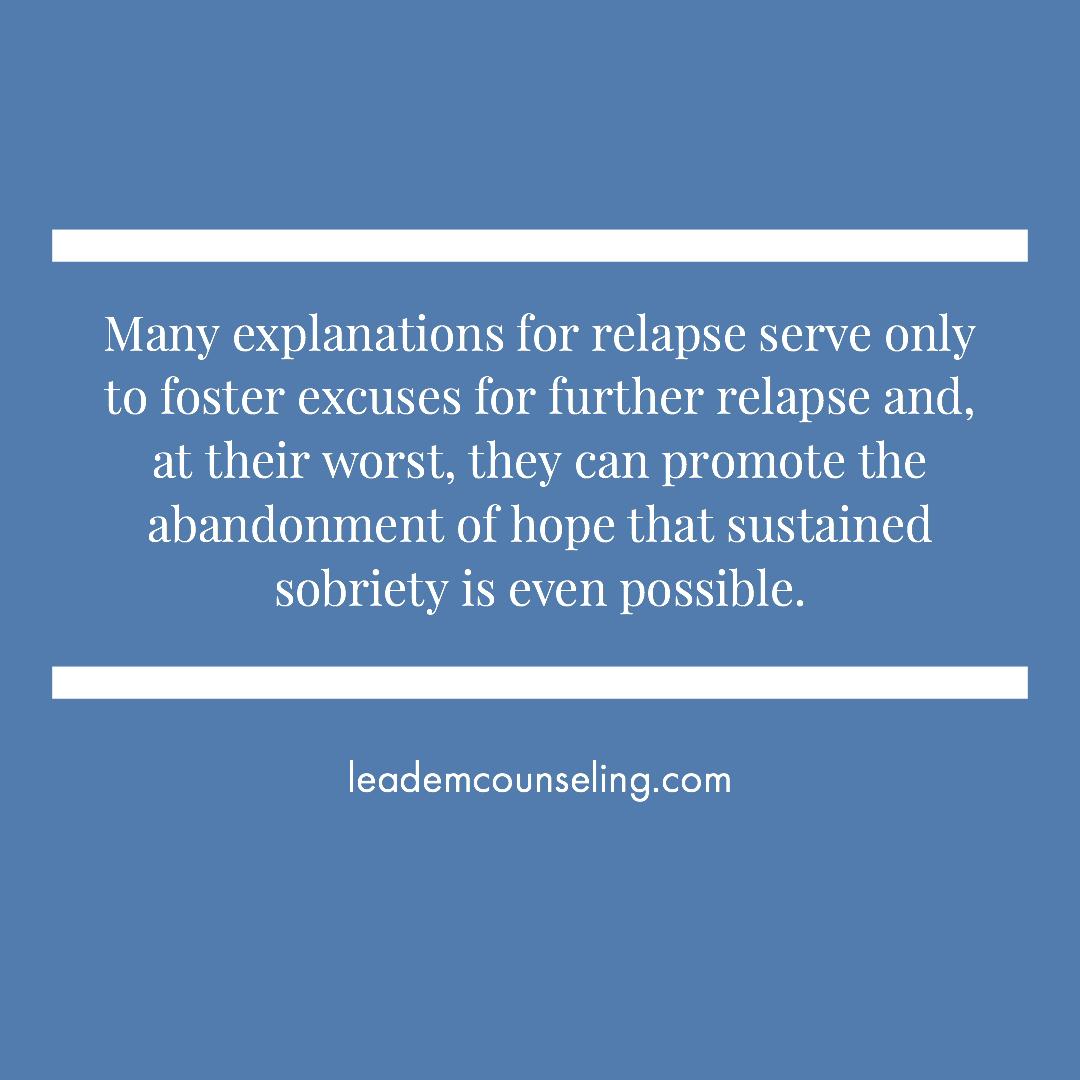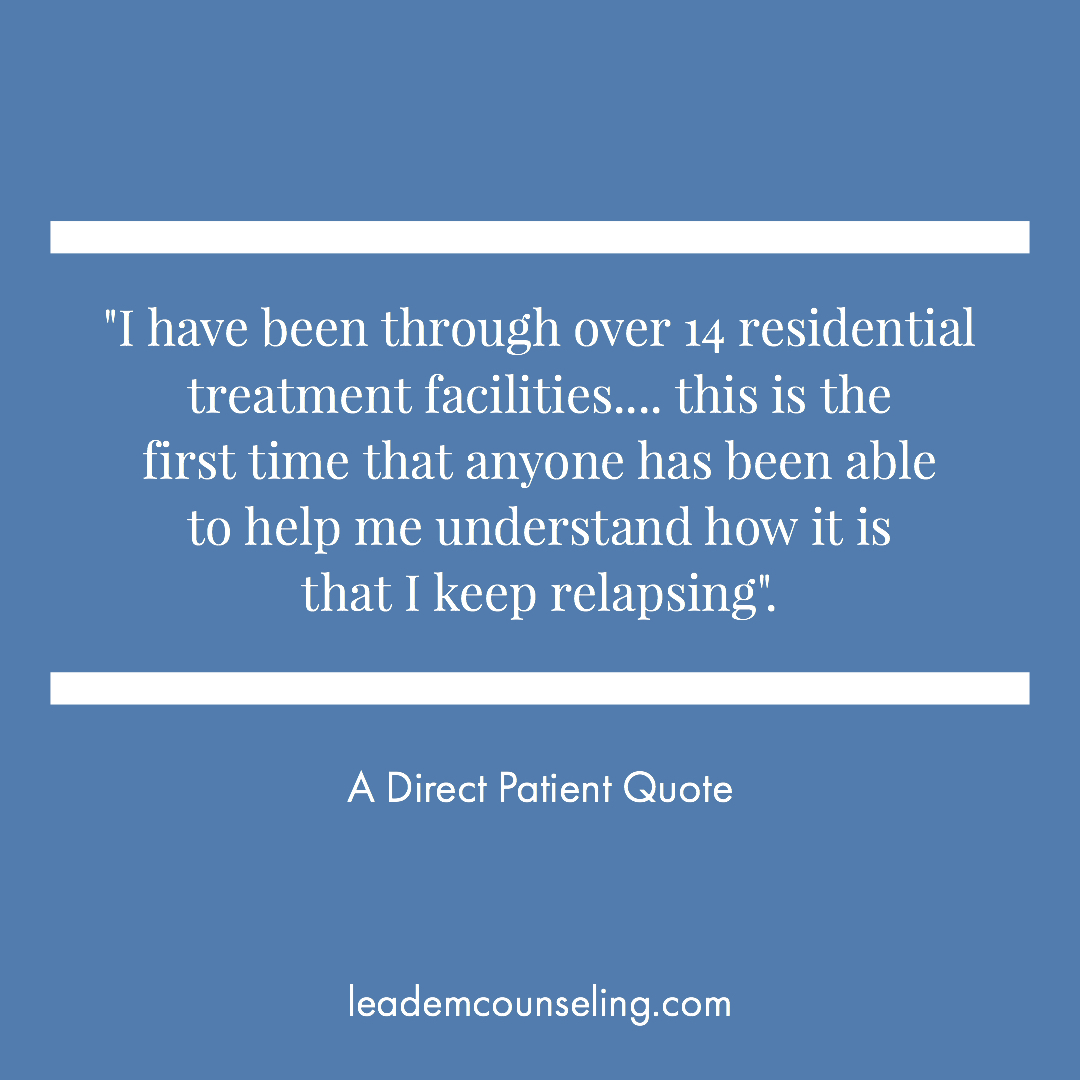Beacon of Hope
Treatment Works, Recovery is Possible & Relapse is Not Part of It

Addiction treatment works. We have known that for years. The earliest promise of hope that sustained recovery was possible began to materialize from the work that the co-founders of Alcoholics Anonymous witnessed in their work with chronic alcoholics in Akron, Ohio before the fellowship was officially founded in 1935. Since then, the fellowship has grown in numbers to an estimated 2 million members world-wide. [1] Twelve Step fellowships, such as AA, as well as professional treatment models for treating addiction, have created a convincing body of anecdotal evidence to support the basis for having hope in the recovery process. Unfortunately, that hope is routinely undermined by well-meaning authors and treatment providers who promote the idea that relapse is a part of the recovery process. It is not. We believe that hope in the recovery process is greatly diminished by the position that relapse is to be expected.
We have heard many explanations for why alcoholics and other addicts relapse. Most are empty and contribute nothing towards helping the addict to regain a foothold in recovery. Many explanations for relapse serve only to foster excuses for further relapse and, at their worst, they can promote the abandonment of hope that sustained sobriety is even possible.The explanations range from the naive position that addicts relapse, “because it seems like a good thing to do at the time” to the absurd hypothesis that there is a “dark force alive in every addict that longs for death but will be satisfied with seeing an addict return to his or her drug of choice.” These theories, along with the dangerous self-fulfilling prophecy promoted by many providers, that “relapse is a part of the recovery process,” are the obstacles to acquiring hope and instead promote despair. We have been challenging them for over 45 years.
We have sat for many hours with addicts’ families who fear that it is hopeless and that they are foolish for believing that this time things could be different. We have been blessed with the opportunity to embrace the hearts of men and women who have been emotionally and spiritually mangled in the revolving door of treatment — relapse — treatment — and repeatwho have come to view hope in the recovery process as the wisdom of a fool. When they are pressed, you will find that they are frightened of ever having hope again as if having hope breeds self-delusion and is a setup for disappointment. We have sat in treatment planning meetings at rehabilitation facilities whose roll call routinely reflected a 22% rate of recidivism and attempted to introduce an alternative to blaming the client’s lack of motivation or the staff’s lack of objectivity.
Relapse Can Deeply Impact All Who Are Close Enough
Awhile back, we were at a treatment planning meeting of a prominent residential addiction treatment facility with the aim or presenting to the treatment team our relapse prevention model. Just before we were about to get started we were interrupted by an announcement to the staff that a client, whose progress in treatment was celebrated in morning rounds following his successful discharge on Friday, was currently being readmitted for detox. The reactions around the room were profound. Some sat in silence with tears in their eyes, others quickly moved to blame the “people, places, and things that he failed to avoid” and still others began searching for ways that they personally, or the program in general, may have failed the client. All ten of them had no idea where to go next. After a bit of grumbling, they arrived at the unanimous conclusion that the client had been through too many treatment programs (three previous admissions to competitors and now the third readmission to their program) and that they needed to get him to forget everything he learned and start over again.
back, we were at a treatment planning meeting of a prominent residential addiction treatment facility with the aim or presenting to the treatment team our relapse prevention model. Just before we were about to get started we were interrupted by an announcement to the staff that a client, whose progress in treatment was celebrated in morning rounds following his successful discharge on Friday, was currently being readmitted for detox. The reactions around the room were profound. Some sat in silence with tears in their eyes, others quickly moved to blame the “people, places, and things that he failed to avoid” and still others began searching for ways that they personally, or the program in general, may have failed the client. All ten of them had no idea where to go next. After a bit of grumbling, they arrived at the unanimous conclusion that the client had been through too many treatment programs (three previous admissions to competitors and now the third readmission to their program) and that they needed to get him to forget everything he learned and start over again.
Their plan amounted to no plan at all. It would appear that neither the patient nor the treatment team knew what had gone wrong or when the relapse process had actually begun, and it did not seem like anyone was going to ask. We were saddened by the news of the client’s relapse and the team’s decision to repeat the “same old same old.” We thought to ourselves, what we had heard from old timers in the recovery culture many times over the early years of our recovery: “if you do what you always did then you are going to get what you always got!” We did not scream because that would not have been very professional but we wanted to. The patient had ended up in the same place again because he was coping with his emotional discomfort in the same way that he always had but it probably did not start on Friday night. It probably began while he was still in treatment. Relapse is a process that will eventually end in an addict’s return to his or her drug of choice if maladaptive coping strategies are not replaced with tools for sober living that provide healthy ways of coping with emotional and spiritual challenges.
The staff was deeply impacted by the news and we abandoned our planned presentation in order to have time to help the team process the pain they were being flooded by. We never had the opportunity to provide them with an in-depth training aimed at demystifying the relapse process because the facility was closed before we had an opportunity to return for follow up trainings. It was a sad experience but it motivated us to escalate our plan for launching a training program to help professionals intervene on the relapse process before a “dry drunk” became a wet one
May 2018 – Our Training Program Became a Reality
 We recently had the opportunity to celebrate the graduation of our first class of professionals and recovery coaches from our extensive two-day training program which is the first step in becoming a Certified Relapse Prevention Navigator. The 2-Day training model is designed to prepare candidates to guide addicts and their families througha course in relapse prevention. The training curriculum grew out of our course which is richly illuminated in An Ounce of Prevention: A Course in Relapse Prevention. Popularity for the task-oriented course has been steadily growing. We have enjoyed many opportunities over the past two years to introduce our model in professional continuing education venues across the country. The warm receptions we have received from clients, families and professionals have kept our hope alive that one day we will reach the point where people stop blaming the addict or his or her disease for the daunting threat of relapse.
We recently had the opportunity to celebrate the graduation of our first class of professionals and recovery coaches from our extensive two-day training program which is the first step in becoming a Certified Relapse Prevention Navigator. The 2-Day training model is designed to prepare candidates to guide addicts and their families througha course in relapse prevention. The training curriculum grew out of our course which is richly illuminated in An Ounce of Prevention: A Course in Relapse Prevention. Popularity for the task-oriented course has been steadily growing. We have enjoyed many opportunities over the past two years to introduce our model in professional continuing education venues across the country. The warm receptions we have received from clients, families and professionals have kept our hope alive that one day we will reach the point where people stop blaming the addict or his or her disease for the daunting threat of relapse.
The highlight of the training came during a lunch break during the second day when we were asked by one of the patients enrolled in the relapse prevention curriculum to sign his book. He was beaming and oozing with gratitude as he shared with us briefly his experience in the facility:
I am so grateful that you folks have written this book. I have been through over 14 residential treatment facilities since I was a teen, and this is the first time that anyone has been able to help me understand how it is that I keep relapsing. I was hopeless when I came here and I will be living soon with the knowledge of what my symptoms of relapse will look like and how I can intervene before I drink and drug again. Thank you so much for the program that you have developed. I am different so that outcome is going to be different and I am not afraid to say that.[2]
We left the training and returned to New Jersey with a deeper appreciation for the obstacles that professionals and addicts must overcome in order to understand that relapse is a part of the disease, but not the recovery process and can be identified in every individual prior to a return to his or her drug of choice.
We will close with a composite review by another client from the same facility because it heralds the hope that she was extending to future clients of the program as is the facility’s practice:
The days leading up to treatment I found myself frantically calling different rehabs praying that one of them would take me. Defeated and hopeless, I finally found The Right Step (Euless, Texas). Everything fell into place. I came here full of doubt and skeptical that I would make it this time [because] I have been to over a dozen rehabs and [have] convinced [myself] that there was nothing more I could learn. My counselor introduced me to Ms. Patty and the Chronic Relapse Prevention Program [and] after hearing some of the lecturesand diving into the [coursebook] I started to feel like I had a fighting chance and I wasn’t a hopeless case anymore. I am so grateful for this program. I can no longer blindly fall into a relapse without being able to identify my alarming behaviors and intervene with my personalized relapse prevention plan.
If we can help you to help those who are struggling to build a sober life-style, please feel free to contact us. There is a beacon of hope for you to draw from in service to others.
See our book: An Ounce of Prevention: A Course in Relapse Prevention
Related Article(s)
Relapse Prevention: A Family Affair
Relapse Prevention: A Family Affair (Part II): Children See & Hear, So They Should Speak
What is Relapse? What is Relapse Prevention?
About the Authors
 Both John and Shawn Leadem are Licensed Clinical Social Workers in private practice in Toms River, New Jersey.
Both John and Shawn Leadem are Licensed Clinical Social Workers in private practice in Toms River, New Jersey.
John has recently celebrated his 45th year in recovery and believes that “service to others is the cornerstone of spiritual maturity.” His professional service to addicted individuals and their families has included the development and direction of addiction treatment services in a full array of modalities from half-way houses to large residential treatment facilities over the past 44 years.
Shawn’s lifelong exposure to the recovery culture and his personal recovery experience has left him with a deep personal empathy for the social and emotional suffering endured by others and a strong faith in a person’s ability to change. He has received his certification as a Sexual Addiction Therapist and as a Multiple Addictions Therapist by the International Institute for Trauma & Addiction Professionals.
Together, John and Shawn have co-authored and brought their unique treatment model of relapse prevention, An Ounce of Prevention: A Course in Relapse Prevention, to residential treatment centers across the United States, they have trained therapists at numerous national and international conferences, and most recently have trained many EAP programs associated with many State Unions.
Copyright, John Leadem & Shawn Leadem, 2018
You are free to copy this article for future reference, to post it on other web sites and to share it with family or friends. If you would like to have permission to include it in a publication of your own you can request written permission by contacting the authors at www.leademcounseling.com.
Footnotes:
[1] Service Material from the General Service Office – “Estimates of A.A. Groups and Members as of January 1, 2018”
[2] The actual dialogue has been altered so it would be impossible to know the person’s identity. As usual we have used a composite of many clients we have spoken with over the years regarding relapse. The gratitude though was particularly powerful coming from such a wounded person.
[apss-share networks="facebook, twitter, google-plus, pinterest, linkedin" counter="0" total_counter="0" http_count="1"]







No Comments Yet | Post Comment
You can be the first to comment!
Leave a comment